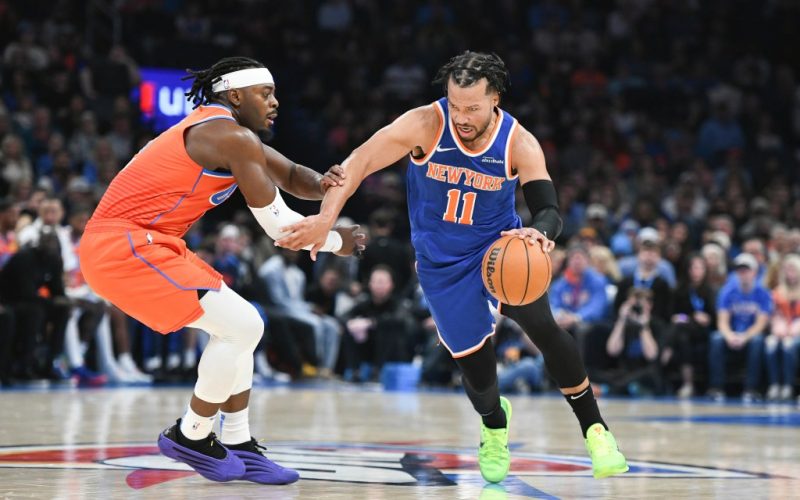That got ugly, quickly.
The Knicks were in control, staring a 10-game winning streak down the barrel, leading by 12 with just four minutes left in the third quarter of Friday’s showdown against the Oklahoma City Thunder — the hottest team in all of basketball riding their own 13-game winning streak as New York’s toughest test since their Dec. 11 NBA Cup quarterfinal loss to the Atlanta Hawks.
Then came the collapse.
The Knicks unraveled in the fourth quarter, losing the final period 38-17 en route to a 117-107 defeat at Paycom Center.
The loss raised some red flags about the team’s readiness to contend at the highest level.
Because the how of this loss is far more troubling than who the Knicks lost to.
After all, there’s no shame in falling to a team like the Thunder, especially on their home court, even if it’s in the second leg of the opponent’s back-to-back.
But the loss does feed the narrative that the Knicks have padded their win column against weaker competition while struggling to keep up with the NBA’s elite.
Friday’s performance wasn’t without its positives. The Knicks proved they belong in the championship conversation, hanging tough with a bona fide title contender for three quarters.
The loss, however, laid bare the areas that require urgent improvement if New York is serious about challenging the Boston Celtics and Cleveland Cavaliers for a shot at the Eastern Conference throne.
HOW DORT DERAILED THE KNICKS
Lu Dort was glued to Jalen Brunson. Every dribble came with a hand on his hip as Dort picked him up the full length of the floor.
By the third quarter’s opening possession, Dort’s Thunder had a mission: disrupt the Knicks’ flow and erase a double-digit deficit.
In the second quarter, the Knicks thrived by turning defense into offense, building a lead that peaked at 14 points.
But in the third, the Thunder returned the favor, spearheaded by their relentless defensive stalwart who channels the physicality and grittiness of Dyson Daniels and Dillon Brooks, two players who have foiled the Knicks’ offensive plans this season.
Dort wasted no time setting the tone.
On the first possession of the second half, he hurried Brunson into a crowded paint where the Knicks’ point guard lost the ball. Oklahoma City capitalized immediately, rushing up the floor to find Cason Wallace for a wide-open transition three.
Moments later, Dort denied Brunson’s off-ball cut with what might have been called a hold on another night.
Then, he intercepted a Josh Hart pass intended for Karl-Anthony Towns in the low post.
And on the ensuing possession, Dort forced another turnover, knocking the ball off Mikal Bridges’ knee and out of bounds. Three consecutive turnovers, all engineered by Dort, swung the game’s momentum early in the second half.
Dort finished the night with a modest stat line — 11 points, 2 rebounds, and 1 credited steal — but those numbers undersell his impact.
He forced another turnover later in the third, jumping a Brunson bounce pass intended for Hart after a screen. His most important stat? Five personal fouls, a testament to the physicality he brought in 33 minutes of play.
Meanwhile, the Thunder feasted off the chaos Dort created.
Oklahoma City turned 12 Knicks turnovers into 18 points and dominated in transition, outscoring New York 23-10 in fast-break opportunities.
Dort’s defense at the point of attack set the tone for the Thunder. For the Knicks, he represents a recurring problem: players who muck up the game with physicality, versatility and sheer determination.
If the Knicks want to win deep playoff battles against the likes of Boston and Cleveland, they’ll need to figure out how to handle players like Dort who thrive in the mud.
BENCH BLUES: KNICKS’ DEPTH EXPOSED
Dort’s tenacity didn’t just expose the Knicks’ struggles at the point of attack — it shone a glaring spotlight on their lack of bench depth.
One could argue that Dort, a centerpiece of the Thunder’s defensive schemes, might have been better suited for a bench role. After all, Oklahoma City traded Josh Giddy to the Chicago Bulls for Caruso’s services, then signed him to a four-year, $81 million contract extension.
Injuries, however, have disrupted Caruso’s plans. Friday marked his fifth consecutive game missed due to a hip strain and his 13th DNP of the season. Former No. 2 overall pick Chet Holmgren also remains sidelined with a pelvic injury.
Unlike the Knicks, however, the Thunder are built to weather these injuries.
And they are built to exploit teams lacking quality bench depth. Isaiah Joe is another example of a Thunder rotation player stepping up in key moments.
Joe used a step-back to create a river’s worth of space from Towns before making a three late in the fourth quarter to give the Thunder their first lead of the second half.
Not to mention Aaron Wiggins erupted for a season-high 19 points, including 15 points on 4-of-4 shooting from deep in the fourth quarter alone.
Oklahoma City’s reserves outscored New York’s bench 44-5 on Friday, with Cameron Payne and Precious Achiuwa scoring the only points from Knicks’ second unit players.
Miles McBride’s absence due to a hamstring injury further thinned the rotation, but even when he’s healthy, the Knicks’ bench ranks last in the NBA in scoring, now averaging fewer than 20 points per game.
Meanwhile, the Thunder stretched their rotation to 10 players on Saturday. They boast the potential for a legitimate 12-man lineup once Caruso and Holmgren return to action.
Cleveland, too, can go 12 deep, and Boston’s 10-man unit is fresh off an NBA title run.
The Knicks, by contrast, leaned heavily on their starters once again.
Landry Shamet logged 14 minutes off the bench, while Achiuwa and Payne managed just eight apiece. An injured McBride watched from the sidelines as New York’s already limited depth was laid bare.
With the Feb. 6 NBA trade deadline looming just 33 days away, Friday’s loss served as another harsh reminder: the Knicks need to address their bench depth.
Yet doing so will be easier said than done.
Their salary cap constraints leave limited flexibility, and the intrigue surrounding a healthy Mitchell Robinson rejoining the rotation adds another layer of complexity given his salary is the team’s largest outside of the starting five, thus making it one of the franchise’s more attractive trade chips.
KNICKS’ DEFENSIVE LAPSES COST THEM
It’s no surprise Wiggins had a career night.
When Shai Gilgeous-Alexander had the ball, all 10 Knicks eyes were locked on him.
The Knicks defended S.G.A. admirably, with Mikal Bridges and OG Anunoby tag-teaming to make life as challenging as possible.
The Thunder star still managed 33 points on 12-of-26 shooting, but his buckets rarely came uncontested — save for a jaw-dropping spin move that sent Hart sprawling and drew Isaiah Hartenstein out of his seat to celebrate.
The problem wasn’t S.G.A.
It was what the Knicks sacrificed to contain him: attention to the Thunder’s other shooters, particularly in transition.
Oklahoma City shot a blistering 52% from three, nailing 14 of their 27 attempts, including a game-sealing 6-of-8 in the fourth quarter. Time and again, the Thunder capitalized on the Knicks’ late defensive rotations.
Take one possession, for instance: Three Knicks defenders crowded two Thunder players on the right side of the floor, leaving Dort free to cut from the left wing into the paint. Towns had no choice but to trail Dort, conceding a wide-open look for Wiggins on the opposite wing.
He drained the open triple, with all five Knicks starters flailing their arms in frustration, suggesting a miscommunication late in the game.
On an ensuing possession, the Knicks were late again.
Dort set a high screen for Gilgeous-Alexander, rolled to the basket to draw the defense, then kicked it back out to Wiggins again.
Brunson and Towns were caught in no man’s land, giving the hot hand just enough daylight to splash a go-ahead three.
Even on the game’s final possession, with the Thunder already having put the game out of reach, the Knicks couldn’t shore up their defensive lapses.
Bridges and Towns doubled Gilgeous-Alexander at the top of the key, forcing him to pass to Wiggins. On a career night, he faked a pass to Dort in the corner, blew past Brunson, and drove into the paint to collapse the Knicks’ defense.
The result was predictable: Wiggins drew three defenders and found Dort wide-open in the corner. Dort’s three capped a 117-107 Thunder victory that snapped the Knicks’ nine-game winning streak.
For the Knicks, this loss was more than just a stumble against the West’s best.
It was a valiant effort that underscored the discrepancy between a team constructed to compete for a title and a team hoping to overcome its shortcomings with a stacked starting five.
Friday’s clash was a heavyweight bout disguised as a regular-season game — a tantalizing preview of what could be an epic seven-game series.
The only way basketball fans will be treated to such a series, however, is if the Knicks and Thunder meet in the NBA Finals.
For the Knicks, that dream won’t materialize if they can’t address the defensive lapses and bench struggles that derailed them in Oklahoma City.
The good news? They won’t have to wait long to re-measure their progress.
The Thunder come to Madison Square Garden on Jan. 10.
The Knicks will be waiting.








